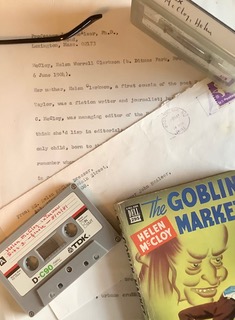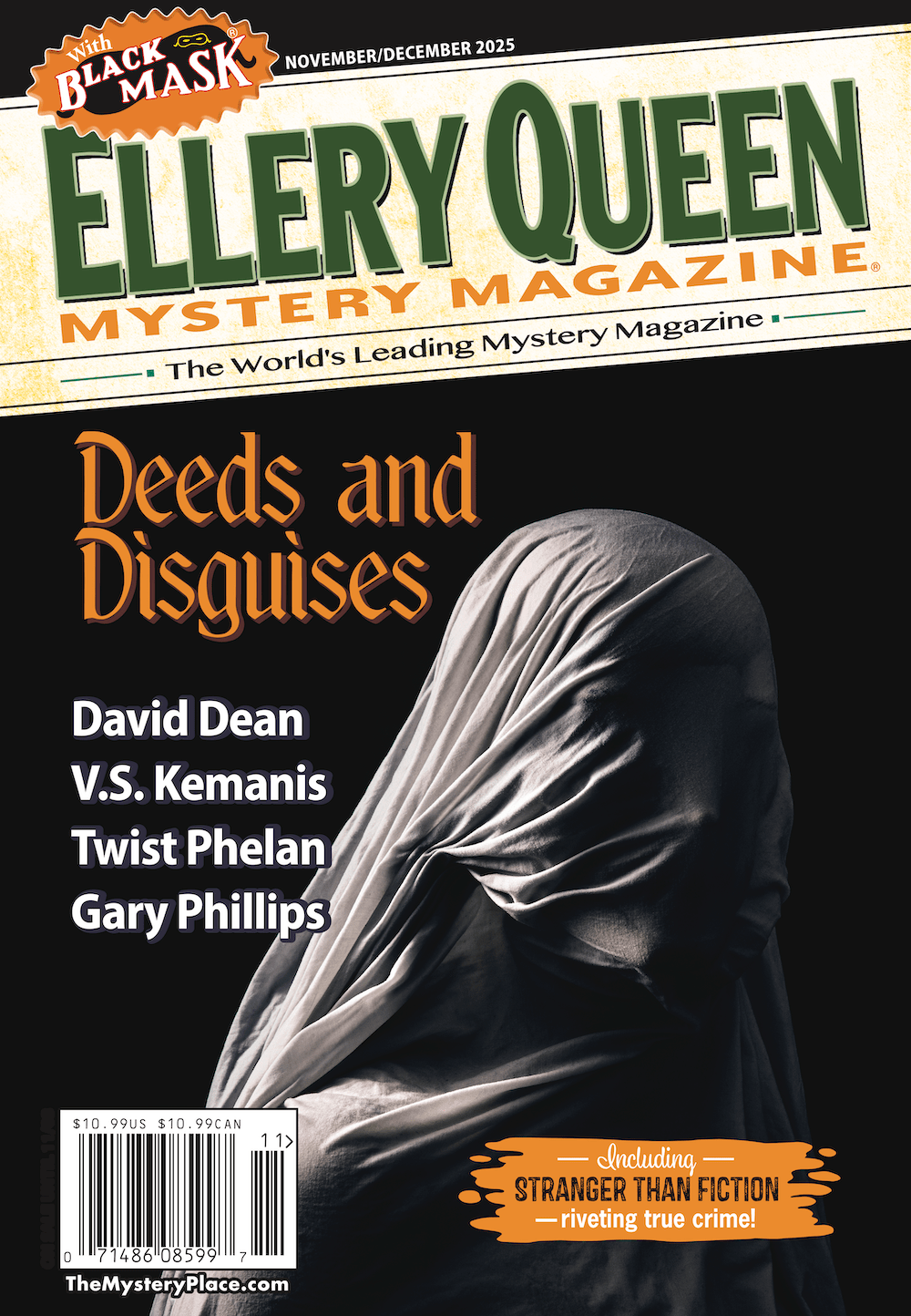Andrew McAleer is the author of 101 Habits of Highly Successful Novelists and coeditor (with Gay Toltl Kinman) of Edgar & Shamus Go Golden. He recently completed two books featuring his father John McAleer’s Golden Age detective Henry von Stray, which will be published in 2025 and 2026: Look for A Casebook of Crime, Volume 1 January 2025 and Volume 2 January 2026, from Level Best Books. Also coming up soon are two more anthologies he’s coedited with Gay Totl Kinman: Shamus & Anthony Commit Capers (Level Best, September 2024) and Agatha & Derringer Get Cozy (Down & Out Books, November 2024). A frequent contributor of posts to this site, Andrew shares with us this time some excerpts of his father’s May 12, 1981 interview with the first woman to serve as president of the Mystery Writers of America, Helen McCloy. —Janet Hutchings

Not long ago I decided to tackle the job of sorting through my father John McAleer’s old black cassette tape box. Among its contents I found two cassettes that immediately piqued my interest. Written on their labels in my father’s distinctive handwriting were the words: “Helen McCloy interview 5/12/81.” Born on June 6, 1904, Ms. McCloy would have been nearly 77 at the time. She died on December 1, 1994.
In addition to listening to the fascinating interview while converting the tapes to digital format, I thought it would be interesting to know where the interview took place. After a thorough investigation of my father’s records, I located his “Helen McCloy” file complete with her original correspondence to him. Poring over the documents with extraordinary interest, I quickly deduced the recordings occurred at her Boston residence located on Bowdoin Street.
I had heard my father often talk about his admiration for Ms. McCloy and her literary works. In addition to having a mutual love of crime fiction they served together on the boards of the Boston Authors Club and the New England Chapter of the Mystery Writers of America—a chapter she helped found in 1971. My father held that Ms. McCloy was one of the more important contributors to the modern detective story and he was not alone in his assessment.
When discussing the importance of good writing and proper structure, Ross Macdonald ranked Ms. McCloy among Elizabeth Saxony-Holding and Charlotte Armstrong. (Murderess Ink). Publishers Crippen & Landru, a publishing house of experts who specialize in preserving the best of classic crime literature—Edward D. Hoch and Ellery Queen among them—credit Ms. McCloy as, “[O]ne of the finest authors of the Golden Age of Detective Stories.”
Moreover, Ms. McCloy was more than a fine author—she was a groundbreaker whose literary influence exists today. In her first book, Dance of Death (1938), she introduced the idea of a psycho-analytic detective in her character Dr. Basil Willing, a psychiatrist. According to her, no such detective of this kind existed in America. A series character, Willing appears in thirteen novels and ten short stories. As part of Crippen and Landru’s Lost Classics series, all ten Dr. Willing short stories now appear in one volume, The Pleasant Assassin.
Through Dr. Willing, Ms. McCloy introduced a new crime-fighting proposition: “Every criminal leaves psychic fingerprints. And he can’t wear gloves to hide them.” A noteworthy and innovative corollary to Locard’s principle: Contact between physical items results in an exchange of material.
Ms. McCloy’s literary contributions to the genre didn’t go unrecognized during her lifetime. In 1950, she became the first woman to serve as president of the Mystery Writers of America. In 1954, she won the Edgar Allan Poe Award for Outstanding Mystery Criticism. In 1980, her suspense novel Burn This (her final Willing novel) won the Nero Wolfe Award. In 1982, she was the guest of honor at Bouchercon and, in 1990, she received the MWA’s highest honor, its Grand Master Award.
To hear Helen McCloy’s voice—a literary legend of the classic, fairplay puzzle mystery, who made her debut during the Golden Age of Detection, discuss her craft and life with my father seemed surreal. Miraculous, really, when you consider the fragile cassettes survived more than four-decades of abandonment.
So miraculous, in fact, that it’s worthy of sharing interview excerpts for the first time anywhere exclusively with Ellery Queen’s Something is Going to Happen followers.
* * *
McAleer: Where was your birthplace, New York City?
McCloy: Yes, but actually I was born in Ditmas Park, which was part of Brooklyn.
McAleer: When you were still in school, did you look forward to a career as a writer?
McCloy: Yes, I can’t remember when I didn’t want to write.
McAleer: You were about 34 years old when you published your first book, Dance of Death in 1938, but had you been writing before then?
McCloy: Oh, yes all during the 1920s and 1930s in Paris. I had written a book, but I hadn’t got it published, I was such an amateur at the time. I have a copy of it some place if I can ever find it. I sent it to every publisher in New York and London and they all rejected it. And every time it came back I rewrote it because I thought there must be something wrong with it, so I must have rewritten it about forty times. It still didn’t get published.
McAleer: What was the title of it?
McCloy: Largent’s Luck.
McAleer: Did you ever study psychology or psychiatry formally?
McCloy: No, but I did a great deal of reading while I was in Paris and I belonged to the Institute of Metapsychique, which was like a society of psychologists and I would attend lectures.
McAleer: R. Austin Freeman created a medico-legal detective Dr. John Thorndyke, had you read much of Freeman and, if so, did you like the Dr. Thorndyke character?
McCloy: I read a lot of Dr. Thorndyke in the 1930s. I read everything—all the detective stories I could in the 30s.
McAleer: Did Freeman influence your creation of psycho-analytic detective Dr. Basil Willing?
McCloy: No. Basil Willing is a psychiatrist because at that time, I don’t think there was a psychiatrist detective. There was one English psychiatrist detective that wasn’t published much in this country. I wanted a detective who was different. There had been no psycho-analytic detective. Willing is eclectic and was new at the time. (1938). What really made psychiatry respectable is when returning soldiers from World War I came home and were helped by psychiatry—this is what really made Freud’s reputation. (Compiler’s note: English physician and author Anthony Wynne introduced amateur detective Eustace Hailey, a doctor of mental diseases in 1925, but McCloy borrowed nothing. [JJM notes].)
McAleer: Are there any writers whom you admire through the years—other detective writers whom you look upon as influences on your work?
McCloy: Well, there is just one I greatly admire and who is unfashionable today even with the French people…but he’ll come back one of these days…that’s [Honoré de] Balzac. He was not always unfashionable because Henry James said he was the matrix of modern literature. Actually there is not a trend in modern literature—except maybe in [James] Joyce’s works—that is not anticipated in Balzac—even the detective story.
McAleer: Rex Stout and Theodore Dreiser were influenced by Balzac. What are your thoughts about Jane Austen?
McCloy: Oh, I love Jane Austen and among mystery writers there is one American woman I particularly enjoy and that’s Elizabeth Daly. My favorite.
McAleer: I have all her novels. Daly didn’t start publishing until she was in her 60s, writing all her novels during a period in life when most people think they’ve had it!
McCloy: Daly has a great literary style and taste and understanding of New York City.
McAleer: Do you gravitate more toward the British mystery than American?
McCloy: I do. They’re the type I like to read because I find them more traditional. Today there’s so much more violence than detection.
McAleer: What do you consider to be your best book?
McCloy: Through Glass, Darkly. Two-Thirds a Ghost I consider my second best.
(Compiler’s Notes: Both novels are part of the Willing series. McCloy chose her favorites wisely! In a recent email from Level Best Books publisher and editor Verena Rose, she shared with me her joy in recently discovering Helen McCloy. “It’s always lovely to discover a new author, but it’s doubly wonderful to discover an author such as Helen McCloy. Two-Thirds a Ghost was my introduction to her crisp writing and interesting plots. I look forward to many more reading hours in her capable hands.”
McAleer: Have you ever written any story that you might consider gothic?
McCloy: I hope not. I wrote two books, A Change of Heart and A Question of Time—which an enemy of mine might describe as gothic—because the editor at Dell said they wanted stories revolving around young girls. I don’t like to write stories around young girls—I don’t like to be told what to write. However, that was a period where gothic stories were selling a lot. (Compiler’s Note: A Question of Time was released in 1971 and A Change of Heart in 1973.)
* * *
In Twentieth Century Crime and Mystery Writers, biographer Nancy C. Joyner observed, “Surprisingly and regrettably, critics have tended to neglect Helen McCloy’s work, perhaps because it sometimes is unfashionably solemn. Yet the variety and the urbane erudition demonstrated in her short stories and novels make them an undisputed and valuable contribution to American detective fiction.”
Critics have neglected McCloy and they oughtn’t to have. Especially when we consider her novel form of “psychological-suspense approach” in her works. (Encyclopedia Mysteriosa).
Fortunately, Helen McCloy’s literary fingerprints are still on the crime scene for all to observe . . . with extraordinary interest.

